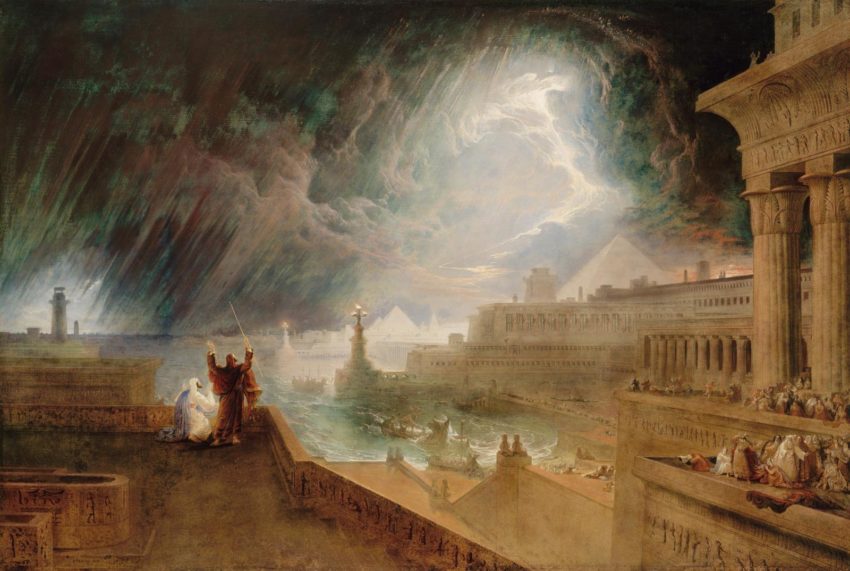Then the LORD said to Moses, “Rise up early in the morning and present yourself before Pharaoh and say to him, ‘Thus says the LORD, the God of the Hebrews, “Let my people go, that they may serve me. For this time I will send all my plagues on you yourself, and on your servants and your people, so that you may know that there is none like me in all the earth. For by now I could have put out my hand and struck you and your people with pestilence, and you would have been cut off from the earth. But for this purpose I have raised you up, to show you my power, so that my name may be proclaimed in all the earth. You are still exalting yourself against my people and will not let them go. Behold, about this time tomorrow I will cause very heavy hail to fall, such as never has been in Egypt from the day it was founded until now. Now therefore send, get your livestock and all that you have in the field into safe shelter, for every man and beast that is in the field and is not brought home will die when the hail falls on them.”’” Then whoever feared the word of the LORD among the servants of Pharaoh hurried his slaves and his livestock into the houses, but whoever did not pay attention to the word of the LORD left his slaves and his livestock in the field.
~ Exodus 9:13-21
I very much appreciated this morning Matthew Henry’s comments on this passage which I felt rightly captured the heart of the text.
A particular prediction of the plague of hail (v. 18), and a gracious advice to Pharaoh and his people to send for their servants and cattle out of the field, that they might be sheltered from the hail, v. 19. Note, When God’s justice threatens ruin his mercy, at the same time, shows us a way of escape from it, so unwilling is he that any should perish. See here what care God took, not only to distinguish between Egyptians and Israelites, but between some Egyptians and others. If Pharaoh will not yield, and so prevent the judgment itself, yet an opportunity is given to those that have any dread of God and his word to save themselves from sharing in the judgment. Note, Those that will take warning may take shelter; and those that will not may thank themselves if they fall by the overflowing scourge, and the hail which will sweep away the refuge of lies, Isa. 28:17. See the different effect of this warning. 1. Some believed the things that were spoken, and they feared, and housed their servants and cattle (v. 20), like Noah (Heb. 11:7), and it was their wisdom. Even among the servants of Pharaoh there were some that trembled at God’s word; and shall not the sons of Israel dread it? But, 2. Others believed not: though, whatever plague Moses had hitherto foretold, the event exactly answered to the prediction; and though, if they had had any reason to question this, it would have been no great damage to them to have kept their cattle in the house for one day, and so, supposing it a doubtful case, to have chosen the surer side; yet they were so foolhardy as in defiance to the truth of Moses, and the power of God (of both which they had already had experience enough, to their cost), to leave their cattle in the field, Pharaoh himself, it is probable, giving them an example of the presumption, v. 21. Note, Obstinate infidelity, which is deaf to the fairest warnings and the wisest counsels, leaves the blood of those that perish upon their own heads.
~ Matthew Henry
In recently wrapping up a series of sermons through the book of Habakkuk, I read this passage this morning and am freshly thankful for our God who “in wrath remembers mercy”. Even to this pagan, oppressive nation, God grants a way of escape from this hail and fire judgment. If they would only fear the Lord and harken unto this threat, they could be spared, them and their livestock. This is grace indeed!
Often times, I hear negative views espoused of the Bible’s warning passages. I am not sure why people either look down on these texts or attempt to use them to promote their twisted and unbiblical positions (i.e. like those who use the warning passages in Hebrews to ay that true believers can fall away from the faith entirely). The warning passages are good and gracious, friends. They are part of the means of grace to us in the Scriptures. They keep us hemmed in, when otherwise we might go far astray. They are the strong voice of God to us, reminding us of both the dangers of sin and the horrors of being left to ourselves. Yet, God will never leave us or forsake us!

